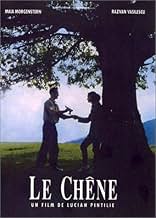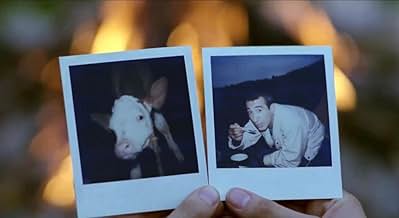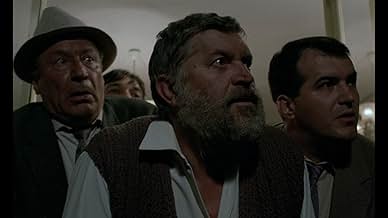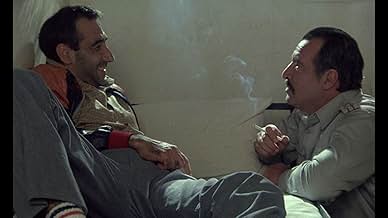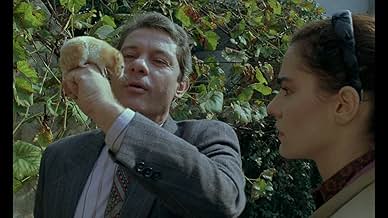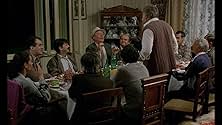VALUTAZIONE IMDb
7,8/10
4100
LA TUA VALUTAZIONE
Una storia della Romania prima della caduta di Ceausescu, attraverso la storia di Nela.Una storia della Romania prima della caduta di Ceausescu, attraverso la storia di Nela.Una storia della Romania prima della caduta di Ceausescu, attraverso la storia di Nela.
- Regia
- Sceneggiatura
- Star
- Premi
- 3 vittorie e 1 candidatura in totale
Recensioni in evidenza
The second Pintilie movie I have seen recently (thanks to Duna TV) and even better than the previous one (O Vara de neuitat): a great movie indeed! This is the Romanian version of Kusturica's Underground, or perhaps I should I say the opposite, since Balanta is actually an earlier piece. The fast-paced, furious story packed with bitter irony and surrealistic moments (well, the closer you live to the country, the less surrealistic they are: comments from people living in Ceausescu's Romania state that the film has nothing "unreal" in it) captures the essence of one of the darker dictatorships of the former Communist Bloc, where the harshness of oppression is softened only by the corruption of the society. Just like Kusturica in Underground, Pintilie presents a very critical picture of the society but at the same time he clearly shows his sympathy towards his suffering but talented and charming nation. All in all: stunning pictures, perfect acting and shocking scenes combine in Balanta for a perfect piece of cinema.
I' give'it a ten because character Mitica is based on a real life person that happens to be my father(not biological but the person who raised me). My father is a urological surgeon that never took money from his patients (I know sounds unrealistic especially for Romania, but is true). One of his patients was Ion Baiesu, who was really impressed by him so he wrote the short novel "thirty-eight point two" and dedicated him. Also the movie "Mere Rosii" (red apples) is about my father.
If you want to know more just e-mail me at Whitenight2mw on yahoo.
Soryy if my grammar isn't so good.
If you want to know more just e-mail me at Whitenight2mw on yahoo.
Soryy if my grammar isn't so good.
Actually the Romanian title of the movie would be "Balance" or "Scales" or "Steel Yard", pick the word most appropriate to your liking for the weight measuring gadget. The international titles (The Oak, la Chene) are linked to the last scene of the movie that metaphorically wraps up significations. The main characters have found the long sought, yet not traceable balance, equilibrium.
Why did I say that it depicts humiliation of intelligence and culture? In communist Romania people that graduated university or college were repartitioned to a job matching their studies. Only the luckiest got a repartition in a large city. Others were summoned for life in hamlets, as you could not promote or change your repartition unless joining the Party. That's the case with the leading character (Maia Morgenstern) that graduated Psichology in Paris, and was repartitioned in Copsa Mica, the most polluted city in Romania.
The caravan of insults starts with the train journey to her new work place. She is forced to switch trains in the night, take her clothes off in the presence of strangers, and ride 400 km standing in an overcrowded train. As she reaches Copsa Mica some people try to rape her, police torture and threaten her, and so on.
To certify the adage that special people congregate the Psichology graduate meets a funky doctor, that manages to elude the system by being some kind of a joker. Then the rejoicing begins as these 2 people get to know each other.
When they decide under the oak tree to give birth to a child she says: "I pray he won't be normal" and he responds "If he'll be normal I'll kill him with my own hands." For these two people being "normal" meant the supreme course. Everybody around was dull, normal and communist. Enjoy!
Why did I say that it depicts humiliation of intelligence and culture? In communist Romania people that graduated university or college were repartitioned to a job matching their studies. Only the luckiest got a repartition in a large city. Others were summoned for life in hamlets, as you could not promote or change your repartition unless joining the Party. That's the case with the leading character (Maia Morgenstern) that graduated Psichology in Paris, and was repartitioned in Copsa Mica, the most polluted city in Romania.
The caravan of insults starts with the train journey to her new work place. She is forced to switch trains in the night, take her clothes off in the presence of strangers, and ride 400 km standing in an overcrowded train. As she reaches Copsa Mica some people try to rape her, police torture and threaten her, and so on.
To certify the adage that special people congregate the Psichology graduate meets a funky doctor, that manages to elude the system by being some kind of a joker. Then the rejoicing begins as these 2 people get to know each other.
When they decide under the oak tree to give birth to a child she says: "I pray he won't be normal" and he responds "If he'll be normal I'll kill him with my own hands." For these two people being "normal" meant the supreme course. Everybody around was dull, normal and communist. Enjoy!
This is the opposite of a Hollywood movie. This is a piece of reality and there is nothing glamorous about it. That's what makes "The Oak" a great movie, an experience to remember.
I am Romanian and I avoided this movie when I was in Romania, because of its subject. Last weekend, I found it in a video store in Seattle and I had to rent it. I am very glad I did and recommend it to all the European film lovers. It will give you an idea (in case you didn't experience it yourself) of what living under the communism meant, with all the pain, frustration and the happier moments.
I am Romanian and I avoided this movie when I was in Romania, because of its subject. Last weekend, I found it in a video store in Seattle and I had to rent it. I am very glad I did and recommend it to all the European film lovers. It will give you an idea (in case you didn't experience it yourself) of what living under the communism meant, with all the pain, frustration and the happier moments.
At the time I read the book the film is based on, it was a reflection of the reality surrounding us, in Romania, therefore after the first print it was banned by the Ceausescu's communist regime. As time went by, I emigrated in the US, and seen the movie 10 years after I've read the book and although the movie supposedly is a fiction, it played like a documentary in front of my eyes. It is hard, as a Romanian, to disconnect from my personal experiences, but if anybody is interested in what the communism in Romania was like, this movie is the way to find out. The tragic and the comedy are coming together to weave the fabric of a society so sick, that life becomes surreal. For my money this is a great movie, the fresco of a society governed by rules unknown to civilization.
Lo sapevi?
- ConnessioniFeatured in Filmare/Filmage (1992)
I più visti
Accedi per valutare e creare un elenco di titoli salvati per ottenere consigli personalizzati
Dettagli
Botteghino
- Budget
- 3.700.000 USD (previsto)
Contribuisci a questa pagina
Suggerisci una modifica o aggiungi i contenuti mancanti


